Immigration Services For Individuals
Immigration Services For Individuals
Family Immigration
Individuals from all over the world need help in filing for immigrant visas for their families. This is because most immigrants come alone to the United States, dreaming of bringing their relatives once they have attained legal status and economic success. This is most likely the reason why there is a long waiting time for Green Cards for family members of U.S. Citizens and Green Card holders.
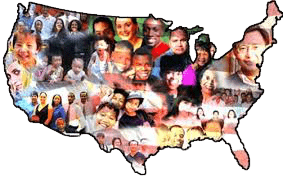
The first step of the green card process involves filing Form I-130, Petition for Alien Relative, with U.S. Citizenship and Immigration Services (USCIS) on behalf of the sponsoring U.S. Citizen or LPR.In this petition, we seek to establish the foreign spouse’s eligibility for permanent residence based on his or her bona fide marriage to a U.S. sponsor.
The I-130 petition involves the preparation and submission of a comprehensive package to USCIS emphasizing the legitimacy of the marital relationship. Applicants must demonstrate their bona fide relationship through marriage certificates, proof of termination of previous marriages, and a host of supporting documentation.
Upon approval of the Form I-130 petition, the second step of the process involves asking the government to physically create an actual green card for an applicant based on his or her bona fide marriage to a U.S. sponsor.
Adjustment of Status: Here, the foreign spouse must physically reside inside the U.S. while the application pends. USCIS grants the applicant interim work and travel authorization while the application is processing. The process culminates in an interview at a local USCIS office in the U.S. Thus, the applicant becomes a Lawful Permanent Resident without having to attend an immigrant visa interview outside the United States. This is generally the faster of the two methods because it can be submitted at the same time the Form I-130 petition is submitted. We welcome you to learn more about this method here: Adjustment of Status.
Immigrant Visa (Consular) Processing: This process requires the applicant to reside outside the U.S. while the green card application pends. Following the approval of the Form I-130 petition, the National Visa Center further processes the application. Ultimately, an immigrant visa interview will be scheduled at an U.S. Embassy or Consulate abroad with jurisdiction over the applicant. Learn more about Immigrant Consular Processing here: Immigrant Visa (Consular) Processing
Both methods of filing have advantages and disadvantages, and a decision should be made based on the applicant’s location at the time of filing, future travel and work plans, and the couple’s preference for processing.
Type of Relative for Whom You May Petition
Spouse
Children(unmarried and under 21)
Sons and daughters(married and/or 21 or over)
Parents, if you are 21 or over
Siblings, if you are 21 or over
Guidance
How Do I Help My Relative Become a Permanent Resident? (Guide for U.S. Citizens)
Related Forms
Form I-130, Petition for Alien Relative
Form I-485, Application to Register Permanent Residence or Adjust Status
Form I-864, Affidavit of Support
Type of Relative for Whom You May Petition
Spouse
Children(unmarried and under 21)
Sons and daughters(married and/or 21 or over)
Parents, if you are 21 or over
Siblings, if you are 21 or over
Guidance
How Do I Help My Relative Become a Permanent Resident? (Guide for U.S. Citizens)
Related Forms
Form I-130, Petition for Alien Relative
Form I-485, Application to Register Permanent Residence or Adjust Status
Form I-864, Affidavit of Support
As a green card holder (permanent resident), you may petition for certain family members to immigrate to the United States as permanent residents.
You May Petition For The Following Family Members:
Spouse (husband or wife)
Unmarried children under 21
Unmarried son or daughter of any age
Application Process
To obtain a green card for your family member, you must:
File Form I-130, Petition for Alien Relative
Provide proof of your status to demonstrate that you are a permanent resident.
Submit evidence of the qualifying relationship such as a birth certificate, marriage certificate, divorce decree, etc. See the form instructions for specific documents required.
Submit proof of any legal name change for you or your family member (the beneficiary).
What Happens Next?
If your relative is already in the United States legally, he or she may apply to adjust status to become a permanent resident after a visa number becomes available using Form I-485, Application to Register Permanent Residence or Adjust Status.
If your relative is outside the United States, your petition will be sent to the National Visa Center (NVC). The NVC will forward your petition to the appropriate U.S. consulate when a visa becomes available and your relative will be notified about how to proceed. This process is referred to as Consular Processing.
Your family member’s preference category will determine how long he or she will have to wait for an immigrant visa number.
Your permanent residence status is conditional if it is based on a marriage that was less than 2 years old on the day you were given permanent residence. You are given conditional resident status on the day you are lawfully admitted to the United States on an immigrant visa or adjustment of your status to permanent residence.
Your status is conditional, because you must prove that you did not get married to evade the immigration laws of the United States. To remove these conditions you must file Form I-751, Petition to Remove Conditions on Residence.
How to Apply to Remove the Conditions
You and your spouse must apply together to remove the conditions on your residence by filing Form I-751. You should apply during the 90 days before your second anniversary as a conditional resident. The expiration date on your green card is also the date of your second anniversary as a conditional resident. If you do not apply to remove the conditions in time, you could lose your conditional resident status and be removed from the country.
No Longer Married? Have You Been Battered or Abused by Your U.S.-Citizen or Lawful Permanent-Resident Spouse or Parent?
You can apply to waive the joint filing requirement if you are no longer married to your spouse, or if you have been battered or abused by your U.S.-citizen or lawful permanent-resident spouse or parent.
In such cases, you may apply to remove the conditions on your permanent residence at any time after you become a conditional resident, but before you are removed from the country. You must provide evidence that removal from the United States would cause you extreme hardship.
If you are a U.S. citizen who wants to bring your foreign fiancé(e) to the United States in order to get married, you will need to file a Form I-129F, Petition For Alien Fiancé(e). This is the first step to obtaining a K-1 nonimmigrant visa for your fiancé(e).
The K-1 nonimmigrant visa is also known as a fiancé(e) visa:
In order to obtain a K-1 fiancé(e) visa, you and your fiancé(e) must intend to marry each other within 90 days of your fiancé(e) entering the U.S as a K-1 nonimmigrant. Your marriage must be valid, meaning both you and your fiancé(e) have a bona fide intent to establish a life together and the marriage is not for the sole purpose of obtaining an immigration benefit.
If your fiancé(e) marries you within 90 days of being admitted to the United States as a K-1 nonimmigrant, he or she may apply for lawful permanent resident status in the United States (a Green Card).
If you have already married, plan to marry outside the United States, or your fiancé(e) is already residing legally in the United States, your spouse or fiancé(e) is not eligible for a fiancé(e) visa.
Consular processing of non-immigrant and immigrant visas at U.S. consular posts is a complex and highly specialized field of U.S. immigration law. We provide specialized consular assistance to visa applicants including:
· Thoroughly researching post policy
· Scheduling visa appointments and requesting expedites
· Reviewing an applicant’s immigration history and status
· Preparing on-line visa application forms and supporting documents
· Conducting consular interview preparation sessions
· Assisting with Third Country National (TCN) visa applications at U.S. consular posts in Canada and Mexico
· Resolving security clearance/administrative processing delays
· Challenging denials with requests for reconsideration or new revised visa applications
Adoption refers to a legal process in which a person or couple assumes the parenting role of a child from others, thereby acquiring parenting rights and responsibilities over the child.
U.S. based adoption takes place within the borders of the U.S. and its territories. Adoption laws differ from one State to another vary according to the state of residence for the parents and the child. The prospective parents must abide to State’ s laws and regulations, which usually consider age, residence, marital status, and other criteria for those involved in the process. The complexities of adoption almost always require an attorney with experience in adoption as it related to adopting an immigrant child. BlackHawk can help many parents navigate this process.
U.S. Based Adoption
There are three main petitions through which the adoptive parents can file for the US immigration of an adopted child:
1. Hague Convention Petition
Hague Convention applies if the adoptive U.S. Citizen parent chooses to adopt from a country that is party to the Convention. In a Convention adoption, U.S. parents are unable to choose a particular child since the potential adoptees are provided by the central authorities of that- country. What’s more, the adoptive parents cannot contact the biological parents, orphanage or legal custodian of the intended adoptee. However, the child will gain U.S. citizenship once the adoption is completed. Moreover, there is an exception by which the U.S. Citizen parent can opt-out of the Hague Convention and proceed directly to an I-130 petition.
2. Orphan Petition
This applies to the immigration of an adopted child from a non-Hague Convention country and also qualifies as an orphan as defined by U.S. law.
3. I-130 petition
Under several circumstances, an adoptive parent can file an I-130 F2A petition for the adopted child. This process is obviously different from the other two adoption processes because it requires adoptive parents to have a two-year legal custody of the child, as well, as a two-year joint residency with the adoptee. Once these two criteria are met the adoptive parents can apply for the child’s immigration benefits.
Do You Want To Work In The U.S.?
BlackHawk assists individuals and corporations with professional transfers to the United States from around the globe. Generally, a citizen of a foreign country who wishes to enter the U.S. for work must first obtain either a nonimmigrant visa for a temporary stay, or an immigrant visa for permanent residence.
Nonimmigrant status allows a person to enter the U.S. for a limited period of time. These visa categories generally require an employer to first file a paper-based, nonimmigrant petition with U.S. Citizenship and Immigration Services (USCIS). The foreign national may then use an approved petition to apply for a visa at a U.S. Embassy or Consulate abroad. Upon issuance of the visa into the applicant’s passport, the employee may then enter the U.S. to work for the sponsoring employer.
Certain nonimmigrant categories (L-1 and TN) allow Canadian citizens to apply in-person for temporary work status at a Class A port-of-entry to the U.S. Upon approval, a work permit is issued on-the-spot and the Canadian may begin employment in the U.S. that same day.
There are many different types of visas available for working in the United States. For more information about the many nonimmigrant visa categories we handle, click on the links below:

Generally, permissible B-1 business activities include work that is “necessary and incidental” to a B-1 visitor’s regular employment abroad. This covers a wide range of activities such as:
Attending and participating in scientific, educational, professional, or business meetings, conventions, conferences, or seminars;
Consulting with business associates;
Engaging in negotiations and executing contracts;
Attending trade shows;
Taking orders for goods produced and located outside the U.S. (NOTE: B-1 Visitors can NOT complete or fill the actual order while in the U.S.); and
Researching options for opening a business in the U.S. (such as locating or entering into a lease for office space).
A business visitor may also come to the U.S. to secure funding for a new business. However, after securing the funding, the person cannot remain in the U.S. to start actual business operations or to manage the business or employees in the states.
Personal or Domestic Employees: Qualified personal or domestic employees may travel to the U.S. in B-1 status under certain circumstances when accompanying:
A U.S. citizen employer who lives permanently outside the U.S. or is stationed in a foreign country and is visiting or is assigned to the U.S. temporarily; or
A foreign citizen employer in the U.S. who is in lawful nonimmigrant status.
For long-term or frequent professional-level work, management, and other hands-on activities in the U.S., a foreign national must obtain formal work authorization through an appropriate visa category.
What We Can Do for You
BlackHawk is skilled in preparing B-1 applications. Our immigration experts are available to consult with both employers and employees to discuss their options and responsibilities.
Visitors who want to enter the U.S. temporarily for business (B-1 category) or tourism/ pleasure (B-2 category) or a combination of both purposes must obtain a B-1/B-2 visa.
Some foreign nationals of certain countries may qualify for a limited 90-day entry with ESTA under the Visa Waiver Program. All other foreign nationals will need to attend a visa interview abroad at a U.S. Consulate or Embassy before they can enter the U.S. as visitors. Canadians are visa exempt and do not need a visa to enter the U.S.
B-2 Visitors
If the purpose of the planned travel is recreational in nature, including tourism, visiting friends or relatives or is related to medical treatment, activities of a fraternal, social, or service nature, or participation by amateurs who will receive no remuneration in musical, sports and similar events or contests, then a visitor visa (B-2) would be the appropriate type of visa for the travel.
Persons planning to travel to the U.S. for a different purpose including students, temporary workers, crew members, or journalists, must apply for a different category of visa.
What We Can Do for You
BlackHawk is skilled in preparing B-1 applications. Our immigration experts are available to consult with both employers and employees to discuss their options and responsibilities.
The E-1 Treaty Trader visa exists for citizens of countries that maintain a treaty of commerce and navigation with the United States. It enables foreign nationals to be admitted to the U.S. solely to engage in international trade on his or her own behalf. In addition, certain employees of such a person or of a qualifying organization may also be eligible for this classification.
Requirements
To qualify for E-1 status, the treaty trader must be coming to the U.S. to conduct trade between the States and the treaty country. In addition, the applicant must:
Be a national of a country with which the U.S. maintains a treaty of commerce and navigation;
Carry on substantial trade with the U.S.; and
Carry on principal trade between the U.S. and the treaty country which qualified the treaty trader for E-1 classification.
What We Can Do for You
BlackHawk is skilled in preparing E-1 applications encompassing a wide variety of industries and occupations. Our immigration experts are available to consult with both employers and employees to discuss their options and responsibilities.
The E-2 Treaty Investor visa exists for citizens of countries that maintain a treaty of commerce and navigation with the United States. It enables an individual to be admitted to the U.S. when investing a substantial amount of capital in a U.S. business. A major benefit of this classification is that it can be utilized by foreign nationals to establish and open a business in the States. In addition, certain employees of such a person or of a qualifying organization may also be eligible for this classification.
Requirements
To qualify for E-2 status, the treaty investor (whether a business or individual) must:
Be a national of a country with which the U.S. maintains a treaty of commerce and navigation;
Have invested or is actively in the process of investing a substantial amount of capital in a new or existing U.S. business; and
Be seeking to enter the U.S. solely to develop and direct the investment enterprise, a real, active commercial undertaking which produces services or goods for profit.
What We Can Do for You
BlackHawk is skilled in preparing E-2 applications encompassing a wide variety of industries and occupations. Our immigration experts are available to consult with both employers and employees to discuss their options and responsibilities.
The E-3 visa classification applies only to citizens of Australia as well as their spouses and children. E-3 principal applicants must be going to the U.S. solely to work in a specialty occupation.
The definition of “specialty occupation” is one that requires:
A theoretical and practical application of a body of specialized knowledge; and
The attainment of a bachelor’s or higher degree in the specific specialty (or its equivalent) as a minimum for entry into the occupation in the U.S.
The proffered position will qualify provided that it requires a minimum of a bachelor’s degree in a specialty occupation. The applicant must prove eligibility for the E-3 category with documentation of sufficient educational credentials, licensure, and/or experience.
Work authorization for E-3 workers is employer-specific (i.e. limited to employment with the approved employer/petitioner).
Prerequisites to Filing an E-3 Petition
There are numerous obligations of an E-3 employer that must be considered:
The petitioner must be a viable entity that can pay the applicant the prevailing wage for someone in a similar position in the location where the work is primarily performed.
A Labor Condition Application (LCA, or ETA Form 9035) must be certified by the Department of Labor (DOL) before the petition is submitted to USCIS or U.S. embassy/consulate.
The employer must also document compliance with the LCA requirements in a “Public Access File” (PAF). The LCA and PAF contain standard attestations that the employer must make, as well as basic wage and location information about the proposed E-3 employment, including rate of pay, period of employment, and work location.
Process
An E-3 application can be submitted in-person upon scheduling a visa interview at a U.S. Consulate or Embassy in Australia. Alternatively, an application can be submitted to USCIS; upon approval, the foreign national will attend a visa interview abroad.
Dependents
The spouse and unmarried children (under 21 years of age) of the primary E-3 applicant may also receive an E-3 visa to accompany or follow the primary holder. They are not required to have the same nationality as the principal applicant. Spouses and children may attend school, and spouses are eligible to apply for work authorization in the U.S.
What We Can Do for You
BlackHawk is skilled in preparing E-3 applications encompassing a wide variety of industries and occupations. Our immigration experts are available to consult with both employers and employees to discuss their options and responsibilities.
The F-1 student visa is the most common visa for students wanting to study in the United States. It is a temporary visa for foreign students who enter the United States in order to continue their education at an accredited school or college.
The steps required to apply for an F-1 student visa may vary based on the U.S. embassy or consulate where you chose to submit your application. Visit USEmbassy.Gov to confirm the requirements for your specific U.S. embassy or consulate.
To begin the process of obtaining an F-1 student visa, you’ll need to:
Fill out the Online Nonimmigrant Visa Application, Form DS-160. Print this application form confirmation page and bring it to your F-1 student visa interview.
Upload Your Photo –Follow the photograph requirements and submit with the online application.
Upon completing your online application, you can then proceed to schedule an interview at any U.S. Embassy or Consulate. It’s best to choose an interview location in the area in which you have permanent residency. Apply for your F-1 student visa early because interview wait times will vary based on location and season.
What We Can Do for You
BlackHawk is skilled in preparing F-1 applications. Our immigration experts are available to consult with both employers and potential employees, as well schools to discuss their options and responsibilities.
The H-1B category is designated for temporary professionals to work in the U.S. in a “specialty occupation,” which is generally defined as a position that requires at least a Bachelor’s degree or the equivalent. The applicant must prove eligibility for the H-1B category with documentation of sufficient educational credentials, licensure, and/or experience.
Work authorization for H-1B foreign specialty workers is employer-specific (i.e. limited to employment with the approved employer/petitioner).
Numerical H-1B Visa Limitations
Each year, Congress limits the number of new H-1B nonimmigrants admitted to the U.S.; it is currently capped at 65,000. Each year, USCIS accepts petitions beginning April 1 until the cap is filled. Petitions are subject to random lottery selection for review and adjudication. If the application is approved, the H-1B visa would be valid for use beginning October 1. Upon approval, the applicant must attend a visa appointment at a U.S. Consulate or Embassy abroad (unless Canadian).
The first 20,000 petitions filed on behalf of beneficiaries with a U.S. Master’s degree or higher are exempt from the numerical cap. Additionally, H-1B workers who are petitioned for or employed at an institution of higher education or its affiliated or related nonprofit entities, a nonprofit research organization, or a government research organization are not subject to this numerical cap.
Dual Intent
An individual may apply for permanent residency (“green card”) and hold H-1B nonimmigrant status simultaneously.
Dependents
Dependents (spouses and unmarried children under 21 years of age) of H-1B workers are entitled to H-4 status with the same restrictions as the principal. Dependents may attend school. As of May 26, 2015, certain H-4 dependent spouses of H-1B nonimmigrants can apply for work authorization as long as the H-1B nonimmigrant has already started the process of seeking employment-based lawful permanent resident status.
Period of Stay
An H-1B nonimmigrant may be admitted for an initial period of up to three years. Extensions may be granted, but generally cannot go beyond a total of six years, though some exceptions do apply under sections 104(c) and 106(a) of the American Competitiveness in the Twenty-First Century Act (AC21).
What We Can Do for You
BlackHawk is skilled in preparing H1B applications encompassing a wide variety of industries and occupations. Our immigration experts are available to consult with both employers and employees to discuss their options and responsibilities.
The H1B1 category was created by the Free Trade Agreements signed with Chile and Singapore in 2003. The 6,800 available H1B1 visas each fiscal year can be an excellent alternative to the H1B visa for citizens of those countries. These visas are deducted from the 65,000 H1B visas that are available worldwide each year. The requirements for the H1B1 are largely identical to those of the H1B.
Requirements
There is no requirement that a petition first be filed with the USCIS. Chileans and Singaporeans may apply directly at a U.S. consulate for an H1B1 visa. A petition may be filed with the USCIS to change status to H1B1, or to extend H1B1 status.
H1B1 status is generally granted in one-year increments, and may be extended.
The H1B1 classification is available to some applicants who would not otherwise qualify for an H1B visa because they do not possess bachelors’ degrees or the equivalent: Chilean citizens who are offered employment as agricultural managers or physical therapists, and Singaporean and Chilean citizens who are offered employment as disaster relief claims adjusters or management consultants.
As with the H1B visa, a labor condition application (LCA), certified by the U.S. Department of Labor, is required.
The spouse and minor children of an H1B1 employee are authorized to live in the United States in H-4 status, and to study, but are not permitted to work.
Unlike H1B and L visas, H1B1 visas are not considered dual intent visas. Therefore, a person in H1B1 status, who files for permanent residence (commonly referred to as a “green card”) may endanger his/her continued H1B1 status.
What We Can Do for You
BlackHawk is skilled in preparing H1B1 applications encompassing a wide variety of industries and occupations. Our immigration experts are available to consult with both employers and employees to discuss their options and responsibilities.
The H-3 visa is useful for a limited group of people, namely those who have been invited to participate in a training program in the United States. The training may be offered by a U.S. branch of their own company or by an unrelated U.S. company. However, the training must be unavailable in the worker’s home country. There are no limits on the number of people who can be granted H-3 visas each year.
U.S. Citizenship and Immigration Service’s (U.S.C.I.S.) regulations recognize some specific types of trainees as potentially H-3 eligible, including certain medical interns or residents; licensed nurses who need a brief period of training that is unavailable in their native country; and special education exchange visitors. The requirements for the latter group are slightly different than for other trainees.
What We Can Do for You
BlackHawk is skilled in preparing H-3 applications encompassing a wide variety of industries and occupations. Our immigration experts are available to consult with both employers and employees to discuss their options and responsibilities.
A J-1 Visa is a non-immigrant visa available to aliens that fall under the designation of “Exchange Visitor.” J-1 exchange visitors travel to the United States through a Department of State approved sponsor program to teach, study, receive training, or demonstrate special skills. To obtain a J-1 Visa, your sponsor must be accredited through the Exchange Visitor Program designated by the U.S. State Department.
Individuals who qualify for J-1 status, if sponsored through an accredited Exchange Visitor Program, include:
Au Pair
Camp Counselor
College or University Student
Government Visitor
Intern
International Visitor
Physician
Professor and Research Scholar
Secondary School Student
Short-Term Scholar
Specialist
Summer Work Travel
Teacher
Trainee
Certain types of J-1 exchange visas require that the alien return to his/her home country or country of last permanent residence for a period of two (2) years after the completion of the J-1 status. However, there are certain circumstances where this requirement can be waived.
What We Can Do for You
BlackHawk is skilled in preparing J-1 applications. Our immigration experts are available to consult with both employers and employees to discuss their options and responsibilities.
The L-1 nonimmigrant category is available to individuals who have worked for a foreign corporation that has a parent, subsidiary, branch or affiliate company in the U.S. The individual must have been employed in an executive or managerial position (L-1A), or in a specialized knowledge capacity (L-1B) for the foreign company.
To qualify for L-1 status, the foreign national must have been employed abroad by the foreign employer on a full-time basis for at least one continuous year during the last three-year period. The individual must be coming to the U.S. to hold a Managerial, Executive, or “Specialized Knowledge” position.
Typically, both the foreign and U.S. entities must have been operating for at least one full year prior to the time of application. Both entities must be actively “doing business,” meaning that they both engage in regular, systematic, and continuous provision of goods and/or services. Both companies should also have an established workforce and sufficient office space to conduct business.
Successful applicants will be approved for a maximum period of three years.
“NEW OFFICE” PETITIONS
The government also permits issuance of an L-1 work permit to individuals who are employed by companies that wish to expand their operations to the U.S. This is referred to as a “New Office” L-1 petition. In this case, the petitioner must demonstrate that a U.S. entity has been incorporated, that sufficient physical space has been secured to conduct business in the U.S., and that the foreign entity is able to commence doing business in the U.S.
There is no “doing business” requirement for New Office L-1 petitions. In lieu of this requirement, the government will grant L-1 status to the applicant for a one-year period. During this time, the petitioning entity must commence business in the U.S. If successful, the company can submit subsequent petitions to extend the applicant’s L-1 status in three-year increments.
For Canadian citizens, an L-1 petition may be filed with U.S. Customs & Border Protection (CBP) at a U.S. port-of-entry and a decision is normally issued immediately. The L-1 beneficiary may begin working in the U.S. immediately following an approval.
The L-1 nonimmigrant category is available to individuals who have worked for a foreign corporation that has a parent, subsidiary, branch or affiliate company in the U.S. The individual must have been employed in an executive or managerial position (L-1A), or in a specialized knowledge capacity (L-1B) for the foreign company.
To qualify for L-1 status, the foreign national must have been employed abroad by the foreign employer on a full-time basis for at least one continuous year during the last three-year period. The individual must be coming to the U.S. to hold a Managerial, Executive, or “Specialized Knowledge” position.
Typically, both the foreign and U.S. entities must have been operating for at least one full year prior to the time of application. Both entities must be actively “doing business,” meaning that they both engage in regular, systematic, and continuous provision of goods and/or services. Both companies should also have an established workforce and sufficient office space to conduct business.
Successful applicants will be approved for a maximum period of three years.
“NEW OFFICE” PETITIONS
The government also permits issuance of an L-1 work permit to individuals who are employed by companies that wish to expand their operations to the U.S. This is referred to as a “New Office” L-1 petition. In this case, the petitioner must demonstrate that a U.S. entity has been incorporated, that sufficient physical space has been secured to conduct business in the U.S., and that the foreign entity is able to commence doing business in the U.S.
There is no “doing business” requirement for New Office L-1 petitions. In lieu of this requirement, the government will grant L-1 status to the applicant for a one-year period. During this time, the petitioning entity must commence business in the U.S. If successful, the company can submit subsequent petitions to extend the applicant’s L-1 status in three-year increments.
For Canadian citizens, an L-1 petition may be filed with U.S. Customs & Border Protection (CBP) at a U.S. port-of-entry and a decision is normally issued immediately. The L-1 beneficiary may begin working in the U.S. immediately following an approval.
O-1: Individual with Extraordinary Ability or Achievement
The O-1A visa is for individuals with an extraordinary ability in the sciences, education, business, or athletics. “Extraordinary Ability” means a level of expertise indicating that the person is one of the small percentage who has risen to the very top of the field of endeavor.
The O-1B visa is for individuals with an extraordinary ability in the arts, or extraordinary achievement in the motion picture or television industry. Extraordinary ability in the field of arts means distinction, or a high level of achievement evidenced by a degree of skill and recognition substantially above that ordinarily encountered in the industry. Similarly, beneficiaries in the motion picture or television industry must demonstrate skill and recognition that is outstanding, notable or leading in the field.
The O-2 visa is for individuals who will accompany an O-1 artist or athlete to assist in a specific event or performance. The O-2’s assistance must be an “integral part” of or “essential to” the O-1’s work in the U.S. The O-2 worker must have critical skills and experience with the O-1 that cannot be readily performed by a U.S. worker and that are essential to the successful performance of the O-1.
To qualify for an O-1 visa, the beneficiary must demonstrate sustained national or international acclaim with plans to continue working in the U.S. in that area of extraordinary ability.
A short-term U.S. work visa known as the P visa is available to outstanding athletes, athletic teams, and entertainment companies (including circuses) with a job offer from a U.S. employer. Their essential support personnel may also be granted visas with the same letter-number designations. There is no annual limit on the number of people who can receive P visas.
P-1 visas are available to athletes or athletic teams that have been internationally recognized as outstanding for a long and continuous period of time. Entertainment companies that have been nationally recognized as outstanding for a long time also qualify. P-1 visas can be issued based on the expertise of a group.
P-2 visas are available to artists or entertainers, either individually or as part of a group, who come to the U.S. to perform under a reciprocal exchange program between the U.S. and one or more other countries. All essential support personnel are included. The applicant will need to prove the legitimacy of the program by presenting a formal, written exchange agreement. In addition, a labor union in the U.S. must have either been involved in the negotiation of the exchange or have agreed to it. The U.S. individual or group being exchanged must have skills and terms of employment comparable to the person or group coming to the United States.
P-3 visas are available to artists or entertainers who come to the U.S., either individually or as part of a group, to develop, interpret, represent, teach, or coach in a program that is considered culturally unique. The program may be of either a commercial or noncommercial nature. The P-3 applicant must be coming to the U.S. to participate in a cultural event or events that will further the understanding or development of an art form. In addition, the employer will have to submit on the applicant’s behalf:
Statements from recognized experts showing the authenticity of the person or group’s skills in performing, presenting, coaching, or teaching the unique or traditional art form and showing the basis of knowledge of the person or group’s skill, or
Evidence that the person or group’s art form is culturally unique, as shown by reviews in newspapers, journals, or other published materials, and that the performance will be culturally unique. Essential support personnel of P‑3 aliens should also request classification under the P-3 category. The documentation for P-3 support personnel should include:
A consultation from a labor organization with expertise in the area of the applicant’s skill
A statement describing why the support person has been essential in the past, critical skills, and experience with the principal applicant, and
A copy of the written contract or a summary of the terms of the oral agreement between the applicant and the employer.
The Q-1 visa allows individuals to come to the U.S. to take part in an established international cultural exchange program. The program must provide practical training and employment, while sharing the participants’ native culture, history, and traditions with the people of the United States. There is no cap on the number of visas issued under this category each year.
Key Features of the Q-1 Visa
A Q-1 visa is a nonimmigrant visa and thus requires nonimmigrant intent. In other words, upon the termination of the Q-1 visa an individual must return to his/her native country. Once the individual has entered the U.S. in Q-1 status, he/she can engage only in activities allowed under the visa.
The spouse and children (unmarried, under age 21) of Q-1 visa holders may come to the U.S. under Q-3 visa status. A Q visa petition is approved for the length of the program, or for 15 months, whichever is shorter. The holder of a Q visa may enter the U.S. up to 10 days before the start date of the petition. No extensions of stay are granted upon the expiration of the 15 months. Moreover, the holder of a Q visa who has spent 15 months in the United States may not be issued a visa or be readmitted under the Q visa classification unless he/she has resided and been physically present outside the U. S. for one year. Upon the expiration of the 15 months, an individual has 30 days to depart the U.S.
The TN Visa category was created under the North American Free Trade Agreement (NAFTA), which created special economic and trade relationships for the U.S., Canada, and Mexico.
Canadians and Mexicans may be eligible to work in the U.S. as a nonimmigrant NAFTA professional under the following conditions:
The applicant is a citizen of Canada or Mexico;
The prospective job offer is a profession on the NAFTA list;
The applicant will work in a prearranged full-time or part-time job for a U.S. employer (self-employment is not permitted); and
The applicant has the required NAFTA qualifications, meeting the specific education and/or experience requirements of the profession.
With some exceptions, each profession requires the applicant to possess a Bachelor’s degree as an entry-level requirement. In some professions, an alternative to a Bachelor’s degree is listed, such as related experience or special licensing.
For a complete list of professions and minimum requirements under NAFTA, see Appendix 1603.D.1 of NAFTA Chapter 16.
Among the list of designated TN professions are: Accountants, Computer Systems Analysts, Mathematicians, Economists, Management Consultants, Registered Nurses, Engineers, Lawyers, Research Assistants, Graphic Designer, Librarians, Hotel Managers, and more.
I Visas For Representative Of The Media
The I visa is commonly referred to as Media Visa. It is a nonimmigrant visa for foreign media workers traveling to the U.S.A., engaging in their profession and having their home office in a foreign country. While issuing the I visa, the consular officer will consider whether the applicant’s own government grants similar privileges, to representatives of the media or press from the U.S.A. and follow appropriate procedures.
An I visa is for “representative of the foreign media” such as members of the press, film, radio or print industries, whose activities are necessary to the function of the foreign media such as reporters, film crews, editors and other persons in similar occupations, traveling to the U.S.A. to engage in their profession.
The I visa is generally issued only for 1 year and can be applied for abroad or within the U.S.A. as change of status.

R-1 Visas For Temporary Nonimmigrant Religious Workers
R-1 visas are issued to temporary religious workers with non-immigrant intent. The intending worker must be sponsored by a non-profit religious organization that has been present for a minimum of two years within the United States. The petitioning organization and immigrant must demonstrate that the worker will participate in full-time (a minimum of 35 hours) work at the organization per week. The petitioning organization must provide evidence regarding the compensation for the position, which may include: budgets, evidence of previous compensation for a similar position, or verifiable documentation of room and board (if it will be provided). If the religious worker will support themselves during their time in the U.S., they must demonstrate a financial ability to do so and that the position is part of an international missionary program.
R-1 visas grant the religious worker permission to work for the religious organization in the US for up to 30 months; with a possible 30 month extension. A religious worker may remain in R-1 status for up to 60 months. Should a religious worker seek R-1 status again, after previously maintaining R-1 status for 60 months, they must remain outside the U.S. for one full year before seeking R-1 status again.
Additionally, it is the burden of the petitioning organization to evidence their tax exempt status under the IRS as a religious non-profit [Section 501(c)(3)]. It is the burden of the religious worker to demonstrate their membership in the religious organization. Spouses and children under 21 of R-1 religious workers are eligible for R-2 classification, but are not authorized to accept employment as R-2 visa holders.
There are currently no annual quotas or caps for R-1 visas.
How do I qualify for an R-1 Visa?
1. The sponsoring Religious Organization must exist &have a bona fide presence within the U.S. for at least two years prior to petition an alien for R1 status;
2. The sponsoring Religious Organization is tax-exempt under the IRS as described in section 501(c)(3) of the IRS code;
3. The intending religious worker must have been a member of the Religious Organization (including the specific religious denomination or one closely similar in practice and beliefs) for a least two years immediately prior to filing for the R-1 Visa;
4. If applying from outside the US, you must be entering the US for the sole purpose of working and carrying out the duties of the Religious Organization in a religious capacity;
5. R-1 Religious workers who max out the 5 year stay must remain physically outside of the U.S. for 1 full year before seeking R-1 status again.
6. Must be seeking to work in a religious occupation or vocation as defined in 8 CFR § 204.5(m).
7. This includes: Ministers, Rabbis, Priests, Clergy members, or other individuals in a role that directly relates to the dissemination or inculcation of the organizations beliefs or creed that is a recognized occupation within the organization.
8. Other religious workers can include: Vocational religious workers who have taken vows, ceremonies, etc., attesting to a particular religious lifestyle that is recognized by the organization such as nuns, monks, and religious brothers & sisters.
Those who are not eligible include: administrative or supporting occupations such as: maintenance workers, janitors, clerks, accountants, fundraisers, choir members, musicians, administration (when not directly related to the organization’s beliefs or doctrine), or religious students (although study & training is allowed under R-1 status).
Re-enty Permits
For a variety of reasons, many individuals who enjoy Lawful Permanent Resident (LPR) Status (a.k.a. “green cards”) in the United States need to travel outside the United States for significant periods of time. It is important to know that Customs and Border Protection is cracking down on green card holders coming back from extended trips abroad. Any time a green card holder plans to spend, or actually spends, more than six months outside the United States, the green card holder should proactively contemplate the potential immigration consequences of the trip.
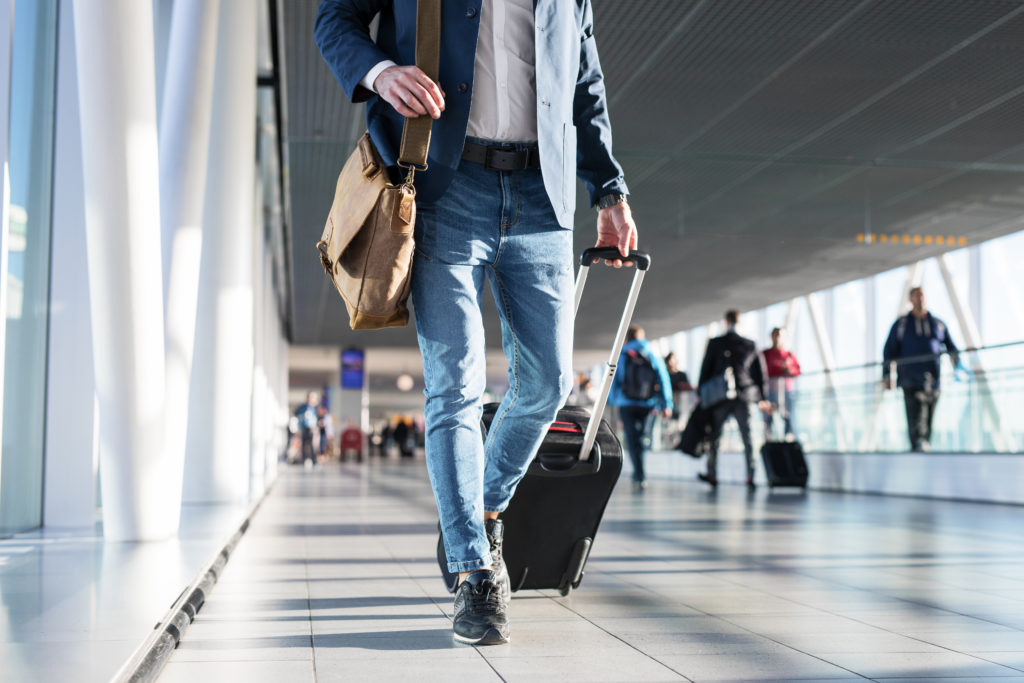
Filing a Re-Entry Permit Prior to Departure
If you know that you will be outside the U.S. for a significant period of time, you can file an application for a reentry permit prior to leaving the United States. The purpose of filing for a re-entry permit is to establish that you do not intend to abandon your status even though you will be spending more time outside the U.S. than is generally allowed.
In the application for re-entry permit, you will need to justify to U.S. immigration officials why you need to remain outside the United States for more than the allowed time period. You should also submit evidence showing continued ties to the U.S. sufficient to prove to immigration officials that you do not intend to abandon your residence in the United States.
A re-entry permit is valid for up to two years. It cannot be extended.
Investor Green Card: Eb-5
Families and individuals who seek to move to the United States on a permanent basis can apply for the EB-5 Immigrant Investor Program.
The United States Citizenship and Immigration Services (U.S.C.I.S.) set out various requirements to obtain permanent residency through the EB-5 visa program. The requirements can be summarized as:
1. The investor must meet capital investment amount requirements; it is typically required to make either a $500,000 or $1 million capital investment amount into a U.S. commercial enterprise,
2. Job creation requirements, and
3. Ensure that the business receiving the investment qualifies for the EB-5 program.
EB-5 visa applicants, their spouse, and their children under 21 will obtain Permanent Residency in the U.S. (a.k.a. a “Green card”) once all requirements have been successfully met and approved by USCIS
Q-1 Visa
The Q-1 visa allows individuals to come to the U.S. to take part in an established international cultural exchange program. The program must provide practical training and employment, while sharing the participants’ native culture, history, and traditions with the people of the United States.
There is no cap on the number of visas issued under this category each year.
Key Features of the Q-1 Visa
A Q-1 visa is a nonimmigrant visa and thus requires nonimmigrant intent. In other words, upon the termination of the Q-1 visa an individual must return to his/her native country. Once the individual has entered the U.S. in Q-1 status, he/she can engage only in activities allowed under the visa.
The spouse and children (unmarried, under age 21) of Q-1 visa holders may come to the U.S. under Q-3 visa status. A Q visa petition is approved for the length of the program, or for 15 months, whichever is shorter. The holder of a Q visa may enter the U.S. up to 10 days before the start date of the petition. No extensions of stay are granted upon the expiration of the 15 months. Moreover, the holder of a Q visa who has spent 15 months in the United States may not be issued a visa or be readmitted under the Q visa classification unless he/she has resided and been physically present outside the U. S. for one year. Upon the expiration of the 15 months, an individual has 30 days to depart the U.S.
Adoption
Adoption refers to a legal process in which a person or couple assumes the parenting role of a child from others, thereby acquiring parenting rights and responsibilities over the child.
U.S. based adoption takes place within the borders of the U.S. and its territories. Adoption laws differ from one State to another vary according to the state of residence for the parents and the child. The prospective parents must abide to State’ s laws and regulations, which usually consider age, residence, marital status, and other criteria for those involved in the process. The complexities of adoption almost always require an attorney with experience in adoption as it related to adopting an immigrant child.

U.S. Based Adoption
There are three main petitions through which the adoptive parents can file for the US immigration of an adopted child:
1. Hague Convention Petition
Hague Convention applies if the adoptive U.S. Citizen parent chooses to adopt from a country that is party to the Convention. In a Convention adoption, U.S. parents are unable to choose a particular child since the potential adoptees are provided by the central authorities of that- country. What’s more, the adoptive parents cannot contact the biological parents, orphanage or legal custodian of the intended adoptee. However, the child will gain U.S. citizenship once the adoption is completed. Moreover, there is an exception by which the U.S. Citizen parent can opt-out of the Hague Convention and proceed directly to an I-130 petition.
2. Orphan Petition
This applies to the immigration of an adopted child from a non-Hague Convention country and also qualifies as an orphan as defined by U.S. law.
3. I-130 petition
Under several circumstances, an adoptive parent can file an I-130 F2A petition for the adopted child. This process is obviously different from the other two adoption processes because it requires adoptive parents to have a two-year legal custody of the child, as well, as a two-year joint residency with the adoptee. Once these two criteria are met the adoptive parents can apply for the child’s immigration benefits.
DACA
The Deferred Action for Childhood Arrivals or DACA Program is a humanitarian initiative implemented by the Obama administration in 2012. The purpose of the program is to protect people from deportation. More specifically it is intended to protect undocumented immigrants who were brought to the U.S. by their parents when they were children. If you came to the U.S. as a minor and you are currently undocumented, you would be protected from deportation by the DACA Program. The DACA Program also allows you to get a temporary work permit, driver’s license, and social security number if you cane to the U.S. as an undocumented child.
Since 2017, the Trump administration has made multiple attempts to wind down the DACA program. But in December 2020, a federal judge ordered the Department of Homeland Security to restore DACA to its original state as implemented by the Obama administration. This means if you meet the DACA eligibility requirements you can submit an initial or renewal application for DACA.
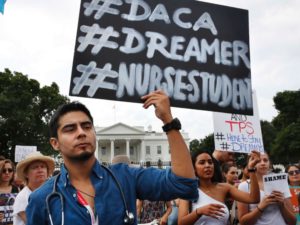
You may request DACA if you:
1. Age as of June 15, 2012 – You need to have been under 31 years of age on June 15, 2012.
2. Age of illegal entry to the U.S. – You need to have been
under the age of 16 when you came to the U.S.
3. Date of illegal entry to the U.S. – You need to have entered the U.S. without inspection before June 15, 2012.
4. Residency – You must have continuously resided in the U.S. from June 15, 2007, to the present.
5. Physically present – You must have been physically present in the U.S. on June 15, 2012, and at the time of requesting consideration of deferred action with the USCIS.
6. Legal status – You must have had no legal status on June 15, 2012.
7. Education – You must be in school, have graduated high school, obtained a GED, or have been honorably discharged from the Coast Guard or armed forces.
8.Criminal history – You must not have been convicted of a felony offense or a significant misdemeanor and you must not pose a threat to national security or public safety.
If you meet the DACA eligibility requirements our experienced immigration experts at BlackHawk Immigration can help you submit an initial or renewal application for DACA.
M Visa: Vocational Student
Unlike F-Visas, which are available to foreign students seeking to enter the United States to engage in purely academic studies, M-Visas are available to foreign students who wish to pursue vocational studies at a community college, junior college, or vocational school (including flight school, cooking school, etc.) in the U.S. The process of obtaining an M-Visa is substantially similar to obtaining an F-Visa, insofar as students seeking an M-Visa must present a valid SEVIS 1-20 at their consular interview and must meet the same general requirements as students seeking F-Visas.
M-Visas are considerably more restrictive than F-Visas. An M-Visa holder is not permitted to change his or her educational objectives once his or her visa has been approved, nor is he or she allowed to change schools without approval from U.S.C.I.S. An M-Visa holder cannot reduce his or her course load without a medical reason, and is not permitted to change his or her status from M-status to F-status or, generally, to change his or her status from M-Status to H-status.
M-Visa holders are not permitted to work in the United States during their educational program, but can be authorized, like F-1 students, for employment in connection to practical training once their studies are complete. Employment may be authorized for either six months or for one month for every four months that the student was in school, whichever is shorter. M-Visa holders are permitted to bring family members to the United States in M-2 status. Many times students get accepted by their school of choice but are unable to attend classes because they were denied the visa at the interview at the U.S. Embassy or Consulate. The experienced immigration experts at BlackHawk Immigration can help you prepare for the interview and assemble the requisite supporting evidence.
Student Visas
Application Requirements for F-1 Student Visas
An alien who is going to pursue full-time academic studies in a college, university, seminary, conservatory, academic high school, private elementary schools, other academic institution, or language-training program in the U.S. can apply for an F-1 Visa with a U.S. consulate abroad. In order to be eligible to apply for an F-1 Visa, various documents should be submitted to the U.S. Embassy or Consulate abroad. An F-1 Visa holder is permitted to change his or her educational objectives once the visa has been approved and is also allowed to change schools without approval from U.S.C.I.S.. F-1 Visa holders can change status to other visa categories like H-1B. F-1 Visa holders are not permitted to work in the United States during their educational program, but can be authorized for employment in connection to ‘practical training’ once their studies are complete. Students who hold a degree in the STEM fields (Science, Technology, Engineering and Mathematics) are also eligible for a 17-months extension on their ‘occupational practical training.’
F-1 Visa holders are permitted to bring family members to the United States in F-2 status.
Many times students get accepted by their school of choice but are unable to attend classes because they were denied the visa at the interview at the U.S. Embassy or Consulate. The experienced immigration experts at BlackHawk can help you prepare for the interview and assemble the requisite supporting evidence.
N Visa
Under the North Atlantic Treaty Organization (NATO), certain representatives and staff from member countries can enter the U.S. with temporary visas. Under the treaty, these visa holders are not subject to normal immigration inspections and documentary requirements. Instead, consular officials decide whether they are admitted. Admission is for as long as the Secretary of State recognizes their status. Employment authorization is obtained through the State Department.
An alien shall be classified under the symbol NATO-1, NATO-2, NATO-3, NATO-4, or NATO-5 if he or she is seeking admission to the United States under the applicable provision of the Agreement on the Status of the North Atlantic Treaty Organization, National Representatives and International Staff, or is a member of the immediate family of an alien classified NATO-1 through NATO-5.
However, many armed forces personnel are exempt from passport and visa requirements if they are either attached to NATO Allied Headquarters in the United States and are traveling on official business, or are entering the United States under NATO Status of Forces Agreement. In the case of the latter, they must carry official military ID cards and NATO travel orders. Personnel of foreign armed services from other than NATO countries coming to the United States in connection with their military status for education or training at any of the U.S. military schools qualify for A-2 visas.
Diplomatic Visas

We are able to offer assistance to individuals seeking A-Visas, reserved for diplomats and foreign officials performing duties on behalf of their government, and G-Visas for those individuals working at certain international organizations within the United States.
Types of Diplomatic Visas
A1-Visas
A-1 visas are available to ambassadors, public ministers, or career diplomatic or consular officers. Immediate relatives of individuals holding these positions can also qualify for A-1 status.
A-2 Visas
An A-2 visa is based on reciprocity and granted to other officials and employees who have been accredited by a foreign government and who are accepted by the Secretary of State. Members of the immediate families of these officials and employees also receive A-2 visas.
A-3 Visas
A-3 visas are available to attendants, servants, and personal employees of A-1 and A-2 visa holders.
G-Visas
G-Visas are available to individuals working at certain international organizations within the United States. There are five different types of G-Visa:
G-l status is given to the principal resident representative to a permanent mission of a recognized international organization and to his or her immediate family members and staff. G-1 visas are designated for members of a permanent mission of a recognized government.
G-2 status is awarded to representatives of recognized governments and their immediate families who are traveling to the United States temporarily to attend meetings of a recognized international organization.
G-3 status is issued to representatives of non-recognized or non-member governments and to members of their immediate families to allow them to attend temporary meetings of recognized international organizations.
G-4 status is reserved for officers and employees, of any rank, of international organizations, and their immediate family members. Officers and employees of designated international organizations who are not assigned in the United States may be accorded G-4 classification if they intend to transit the United States.
G-5 status is given to attendants, servants, and personal employees of G-1 through G-4 visa status holders.
U Visas For Crime Victims Assisting Law Enforcement
The Victims of Trafficking and Violence Protection Act of 2000 authorized two new visas: the “U” visa for immigrant victims of serious crimes and the “T” visa for victims of severe human trafficking. These visas were created due to rising public safety concerns, with the idea that foreign victims of crimes in the U.S. should be allowed to remain in order to provide law enforcement officials with information that will assist in apprehending and prosecuting criminal offenders.
If you are approved for a U visa, you will be granted legal status in the U.S. for up to four years (which may be extended if “exceptional circumstances” warrant it). Once you have held your U visa for three years, you may be eligible to apply for legal permanent residence (a “green card”).
However, it is not enough to simply state that you have been a victim of a serious crime in order to get a U visa. You will need to provide a certificate of helpfulness from a qualifying law enforcement agency and prove that you suffered mental or physical abuse by a U.S. perpetrator. Additionally, if you are “inadmissible” to the U.S. due to past immigration violations or for other reasons, you will need to apply for a waiver of these grounds.
Citizenship
Becoming A Citizen
Becoming a Citizen
Becoming a United States Citizen is the dream of most immigrants. At times, uninformed immigrants with past criminal acts file an Application for Naturalization on their own and they end up in Removal Proceedings in front of an Immigration Judge. This is because they did not consult a skilled immigration attorney who has reviewed their past history to assess whether they are able to naturalize. Other times, individuals do not apply for naturalization because they are unable to speak English or learn History, and are unaware that certain individuals can file a waiver to waive both tests.
In essence, prior to filing for naturalization it is paramount that a skilled immigration lawyer be consulted. Individuals are often surprised and find out that they are already U.S. Citizens by operation of law.
What Is Naturalization?
Naturalization is commonly referred to as the manner in which a person not born in the United States voluntarily becomes a U.S. citizen.
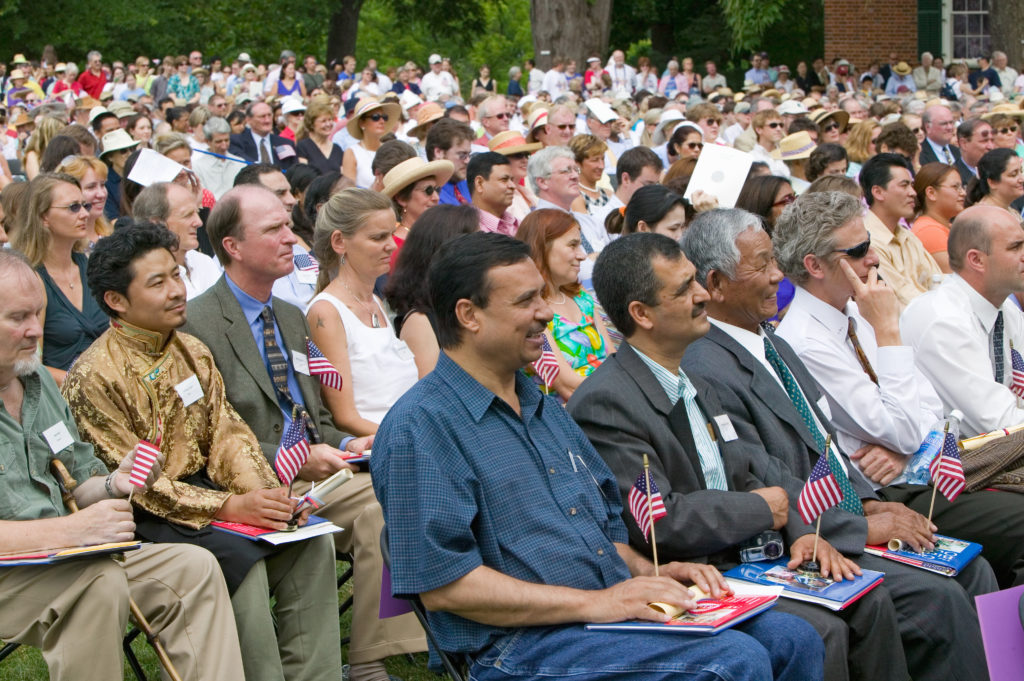
Benefits
The Constitution and laws of the United States give many rights to both citizens and non-citizens living in the United States. However, some rights are only for citizens, such as:
Voting. Only U.S. citizens can vote in Federal elections. Most States also restrict the right to vote, in most elections, to U.S. citizens.
Bringing family members to the United States. Citizens generally get priority when petitioning to bring family members permanently to the U.S..
Obtaining citizenship for children born abroad. In most cases, a child born abroad to a U.S. citizen is automatically a U.S. citizen.
Traveling with a U.S. passport.
A U.S. passport allows you to get assistance from the U.S. government when overseas.
Becoming eligible for Federal jobs. Most jobs with government agencies require U.S. citizenship.
Becoming an elected official. Many elected offices in this country require U.S. citizenship.
Showing your patriotism. In addition, becoming a U.S. citizen is a way to demonstrate your commitment to your new country.
What are the requirements for naturalization?
The process of obtaining U.S. citizenship is called naturalization. Here are the basic requirements for naturalization:
Permanent Residency: You must be a permanent resident, i.e., have a green card to apply for naturalization
Continuous Residency in the United States
Physical presence in the United States
Ability to read, write, and speak English (in most cases)
Knowledge and understanding of U.S. history and civics
Good moral character
Support for the U.S. Constitution and the U.S. government
Common Obstacles to Citizenship, Naturalization
Everyone makes mistakes. But if your goal is U.S. citizenship, even a small mistake many years ago can stand in the way of your dream.
Other potential problems for applicants for citizenship include:
Voting in U.S. elections as a permanent resident
Failure to pay child support
Failure or omission to pay Taxes
Failure to register for selective service (for man only)
Staying outside the U.S. for a long period of time
Separation from your husband or wife
Who can apply for naturalization?
If you are at least 18 years old and have been a Permanent Resident for the past 5 years and have no special circumstances NOTE: Over 90% of applicants fall into this category.
If you are at least 18 years old and are currently married to and living with a U.S. citizen; and have been married to and living with that same U.S. citizen for the past 3 years; and your spouse has been a U.S. citizen for the past 3 years.
If you have 5 years as a Permanent Resident (a.k.a. you had your ‘Green Card’ for 5 years) without leaving the United States for trips of 6 months or longer.
If you are in the U.S. Armed Forces (or will be filing your application within 6 months of an honorable discharge); and have served for at least 1 year.
If you are at least 18 years old and were in the U.S. Armed Forces for less than 1 year or
If you are at least 18 years old and were in the U.S. Armed Forces for 1 year or more, but you were discharged more than 6 months ago.
If you performed active duty military service during:
World War I (April 6, 1917-November 11, 1918);
World War II (September 1, 1939-December 31, 1946);
Korea (June 25, 1950-July 1, 1955);
Vietnam (February 28, 1961-October 15, 1978);
Persian Gulf (August 2, 1990-April 11, 1991); or
On or after September 11, 2001.
Lesbian, Gay, Bisexual, Transgender, and Queer or Questioning (LGBTQ)
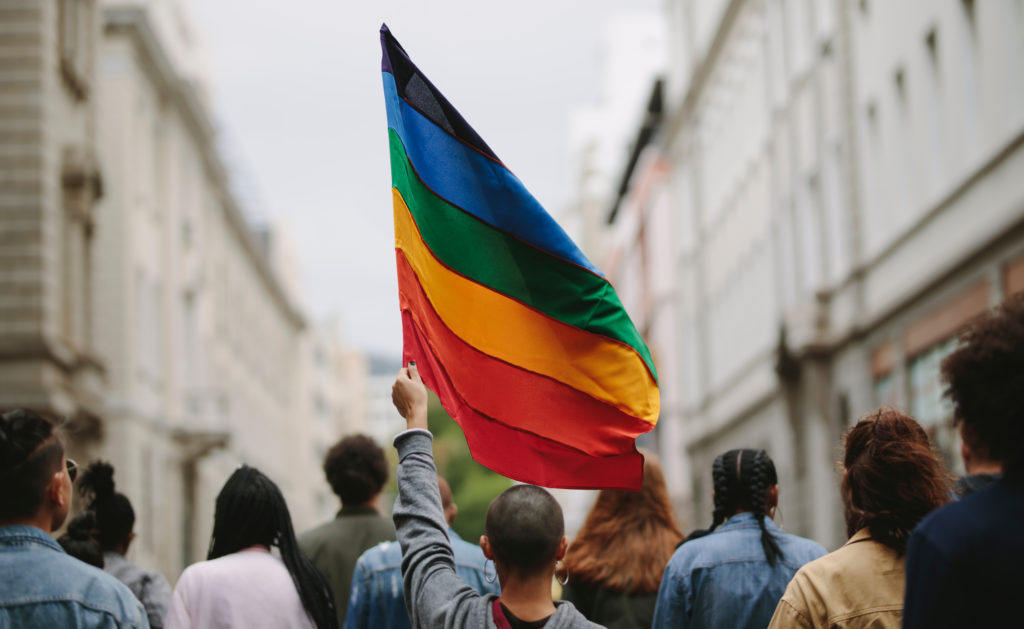
Today, lesbian, gay, bisexual, transgender, and queer or questioning (LGBTQ) non-citizens have the same rights and protections under U.S. immigration law as all other non-citizens. However, LGBTQ non-citizens often face unique challenges when facing immigration law issues. According to the Williams Institute at UCLA, an estimated 267,000 undocumented immigrants identify themselves as LGBTQ. Hoping to flee discrimination, trauma, and persecution, some LGBTQ individuals have sought new beginnings and opportunities in the U.S. and are now seeking work visas, lawful permanent residency, green cards, and citizenship.
The immigration experts at BlackHawk understand the issues LGBTQ non-citizens face and offer immigration services in an LGBTQ-friendly environment. Whether you or your loved one are seeking citizenship, asylum, or are facing deportation, our immigration experts are available to help protect your legal rights and attainable pathways to legal residence or citizenship.
Marriage Cases And Petitions
Today, same-sex marriage is legal in every state in the U.S. LGBTQ non-citizens who are married to a U.S. citizen, legal permanent resident, green card holder, or visa holder, may petition for their immigration status to be protected through their same-sex marriage. Our experienced immigration experts can assist you in filling out and filing the necessary documents in order to become protected through your same-sex marriage.
Abused Spouse Cases
If you have been a victim of a crime, including spousal abuse, you may be entitled to obtain a U visa or a T visa. Moreover, there are special laws and rules specifically for spousal abuse. U visas are made available to immigrants who have been a victim of a certain crime, whereas T visas cover an array of crimes, including human and sex trafficking, as well as forced labor. Victims of domestic abuse may also be protected through the Violence Against Women Act (VAWA). These special types of visas may protect LGBTQ non-citizens from deportation, give them the ability to work legally and provide the option to apply for a green card.
Political Asylum Based On Gender Preference
Many LGBTQ non-citizens come to the U.S. because they seek protection from persecution in their home country. Asylum is a form of protection that may be granted to a non-citizen that flees from their country because they fear they will be harmed because of their race, religion, nationality, political opinion, identified gender, or sexual orientation.
The time to file an asylum protection order is limited. The order must be filed within one year of arriving in the U.S. For more information or to schedule a consultation, contact our immigration experts.
Drivers Licenses for Non-Citizens
If you’re not a citizen of the United States, getting a drivers license can be confusing. There are many requirements that must be met and identification forms that must be provided. BlackHawk can help you navigate the Motor Vehicle commission’s requirements for getting a license as a non citizen.
Passports
There is no single document more important than the passport when it comes to international travel. BlackHawk can support all your passport needs. Whether an individual requires assistance with renewing an expiring passport or replacing one that’s been lost or stolen, we can guide them through the entire process and support the preparation of all documents needed to get them on their way.
Individual Immigration Services
Individual Immigration Services
Our clients say





